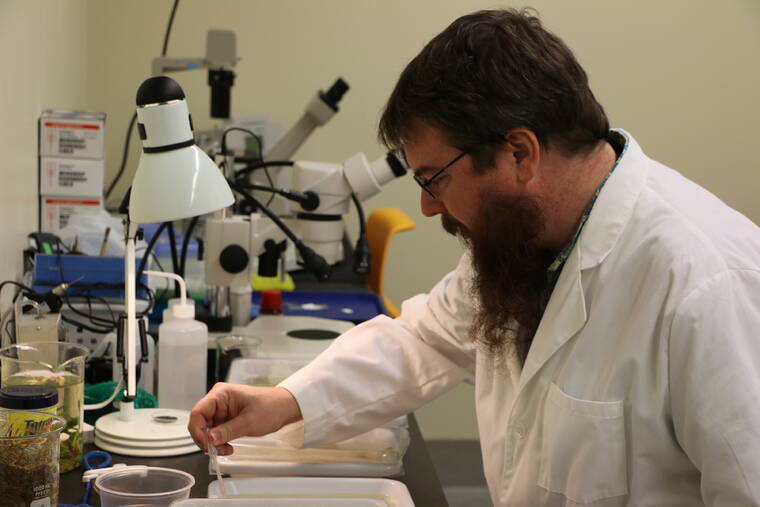State wants to fight mosquitoes with mosquitoes
An advisory committee for the state Department of Agriculture will determine today whether to recommend that the state import mosquitoes to reduce avian malaria.
In an effort to protect several endangered bird species in Hawaii, the Department of Land and Natural resources hopes to reduce mosquito populations, because they are a vector for spreading avian malaria, which threatens species such as the ‘akikiki, the ‘akohekohe, the kiwikiu and the ‘akeke‘e, all of which could go extinct within just a few years.
But to reduce those mosquito populations, the DLNR plans to import more mosquitoes.
The imported mosquitoes — all males — would be infected with a bacterium called Wolbachia that acts as a sort of microscopic birth control system: mosquitoes infected with a certain Wolbachia strain can only reproduce with other insects hosting the same strain.
By releasing a large number of Wolbachia-infected males into a mosquito population that hosts a different strain of Wolbachia, researchers have found that the insects will be unable to lay viable eggs, and the population will shrink. And because male mosquitoes do not feed on blood, they would not be able to spread avian malaria.
The strategy, called the “incompatible insect technique” has been utilized elsewhere around the globe to reduce the spread of diseases such as dengue and Zika.
DLNR spokesman Dan Dennison said via email Wednesday that it is still too early to determine when and where the imported mosquitoes would be introduced, although a statement from the DLNR noted that mosquitoes are threatening bird species on the Big Island, Maui and Kauai.
“The DLNR wants it to be quick, because they want to save the birds,” said DOA spokeswoman Janelle Saneishi. “But this is just the first step.”
The DOA’s Advisory Committee on Plants and Animals will hear testimony regarding a proposal to add three mosquito species — the southern house mosquito, the yellow fever mosquito and the Asian tiger mosquito — to the state’s Restricted Animals List, Saneishi said.
That list, Saneishi went on, allows for the import of listed animal species by research organizations or zoos under specific conditions. The proposal specifies that the mosquitoes would all be inoculated with strains of the Wolbachia bacterium.
Following the committee’s recommendation, the matter will be forwarded to the Board of Agriculture, whose next meeting has not yet been scheduled.
However, Saneishi said much of the testimony received by the DOA so far has been critical of the proposal, calling the incompatible insect technique “genetic engineering.”
The DLNR issued a statement Wednesday explaining that the proposal is not genetic modification in any way.
“These are not genetically modified or engineered organisms,” DLNR chair Suzanne Case said in the statement. “The proposed technique does not modify the genes of mosquitoes or Wolbachia. It is similar process to taking antibiotics, then eating pro-biotics, to replace the existing community of bacteria with a different community within your stomach.”
The committee hearing will take place at 1:30 p.m. today.
Email Michael Brestovansky at mbrestovansky@hawaiitribune-herald.com.


